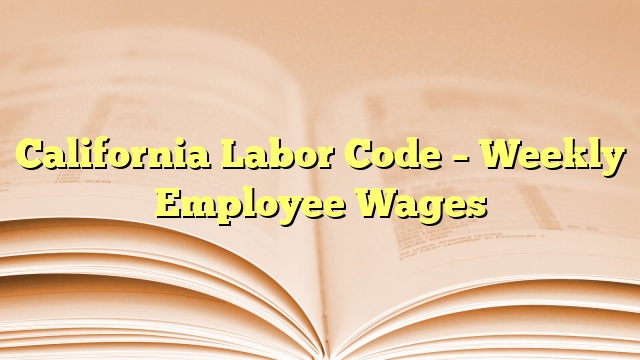
by Adam Treiger | Apr 20, 2024 | Labor, Legal
Are stock option grants “wages” under California law? The recent case of Shaw v. Skillz, Inc. answers that question in the negative – i.e., holding that stock option grants are not “wages” under the CA Labor Code.
The CA Labor Code defines “wages” as “all amounts for labor performed by employees of every description, whether the amount is fixed or ascertained by the standard of time, task, piece, commission basis, or other method of calculation.” (Lab. Code, § 200(a).)
The Court held that stock options are not wages because they are not “amounts” and they cannot be “ascertained.” The Court held that stock options are merely rights to buy stock at a certain price, and there’s no way to know at the time of the grant if those rights will have any value at all, and if so, how much. The Court did recognize CA precedent holding that grants of stock (such as restricted stock grants) to employees are “wages” because they have immediate, ascertainable value, even if the grants are subject to conditions.

by Adam Treiger | Feb 27, 2024 | Labor, Legal
For a long time, the rule in California was that employers could legally round employee time punches to the nearest five minutes, one-tenth or one-quarter of an hour. However, two recent Court of Appeal decisions have questioned that long-standing rule. First, in 2022, in Camp v. Home Depot U.S.A., the court held that rounding to the nearest quarter hour was illegal because employees must be paid for all hours worked. This decision was appealed to the California Supreme Court, and we are waiting to see what the Supreme Court does with the issue.
In the meantime, in July 2023, the court of appeal ruled, in the Woodworth v. Loma Linda University Medical Center case, that the employer’s policy of rounding employees’ punches down to the nearest tenth of an hour violated California law, which requires that employees be paid for all of their time worked.
The Supreme Court will resolve this issue at some point, but it has not done so yet. In the meantime, it is a good idea for employers in California not to round employees’ time but rather to pay employees minute to minute (or, if an employer wants to round, always round up so that the employee gets paid more than the time they worked. As the Supreme Court ruling in Home Depot may have a retroactive effect, it’s important to be cautious now, even before the court rules.

by Adam Treiger | Apr 19, 2023 | Labor, Legal
One Minute Update: In 2019, California passed AB51, prohibiting employers from requiring job applicants or employees to sign a mandatory arbitration agreement as a condition of employment. AB51 was quickly enjoined by a federal trial court, and, in February 2023, the federal appeals court struck down AB51 as violative of the Federal Arbitration Act. California still has some avenues left for further appeal (to the full Ninth Circuit or to the U.S. Supreme Court), but it seems unlikely that this recent decision would be overturned if California did so. Thus, California employers may continue to require mandatory arbitration agreements of its employees if they so desire, at least for now.
Also, in June 2022, the U.S. Supreme Court held in Viking River that individual PAGA claims could be compelled to arbitration if the plaintiff-employee had signed an arbitration agreement with the employer. The court further held that PAGA plaintiff who had to arbitrate such plaintiff’s individual claims, and who waived arbitration of representative claims, did not have standing to litigate the representative part of the PAGA claims in court after the arbitration of the plaintiff’s individual claims was completed. However, in February 2023, a California court of appeal disagreed with the U.S. Supreme Court, in Galarsa v. Dolgen California LLC , and held that the plaintiff’s representative PAGA claims could proceed in court after the arbitration of the plaintiff’s individual claims was completed. This issue will ultimately be decided by the California Supreme Court in the pending case of Adolph v. Uber Technologies, Inc.

by Adam Treiger | Feb 16, 2023 | Labor, Legal
One Minute Update: Effective as of January 1, 2023, AB 1041 amended California’s Paid Sick Leave law to allow an employee to care for a “designated person.” This term is defined differently than it is in other areas of the law (e.g., in the California Family Rights Act), and means “a person identified by the employee at the time the employee requests paid sick leave.” The designated person need not be related in any way, nor must the designated person by in a family-equivalent relationship. An Employer may amend its paid sick leave policy to limit employees to one designated person per 12-month period, if the Employer so chooses.

by Adam Treiger | Jan 18, 2023 | Legal
One Minute Legal Update – Adam Treiger – January 2023
At the end of December, 2022, the California Court of Appeal, in Parsons v. Estenson Logistics, LLC, held that for employees who are paid weekly, when the seventh calendar day following the close of the payroll period falls on a Saturday, wages may be paid the following Monday.
Why was this case brought in the first place? Because CA
Labor Code section 204(d) provides that wages for employees who are paid weekly must be paid “not more than seven calendar days following the close of the payroll period.” In this case, that was a Saturday, and the plaintiffs believed they were therefore paid 2 days late when they got their paychecks on Monday. This may sound like minutia, and it is. But Estenson Logistics had to fight a lawsuit over the issue. The lessons here are that paying attention to the minutia in the Labor Code is important for every employer, and that acting reasonably in the face of ambiguity sometimes can avoid liability.





